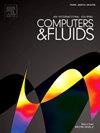基于物理信息的神经网络数值误差估计
IF 2.5
3区 工程技术
Q3 COMPUTER SCIENCE, INTERDISCIPLINARY APPLICATIONS
引用次数: 0
摘要
量化数值误差一直是计算流体动力学中的一个主要问题,主要是由于其最主要的术语,离散误差。实际上,这是网格和时间步长的影响,这对最终结果有很大的影响。然而,由于其性质,量化离散误差通常需要几个精细网格模拟,这可能是非常昂贵的执行。在本研究中,我们提出了一种利用物理信息神经网络(PINN)计算整体数值误差的新方法。通过同时引用离散模拟数据和连续控制方程,PINN可以检测两者之间的任何不一致,并将其转换为数值误差的估计。本研究解释了这一框架,并在几个案例中进行了演示,包括一维热传导、用制造解方法的问题集和雷诺数为1000的腔流模拟。虽然在非常精细的网格上实现这个框架可能具有挑战性,而且它一次只能评估一种类型的变量,但它确实提供了两个主要好处。结果表明,即使数据在渐近范围之外,我们提出的框架也可以可靠而准确地估计各种网格尺寸(从细网格到非常粗的网格)的数值误差。它还只需要一个模拟数据集,消除了执行几个精细网格模拟和适当网格细化的需要。本文章由计算机程序翻译,如有差异,请以英文原文为准。
Numerical error estimation with physics informed neural network
Quantifying numerical error has been a major issue in computational fluid dynamics, mostly due to its most dominant term, the discretization error. Practically, this is the influence of the mesh and time step, which can substantially affect the final result. However, due to its nature, quantifying discretization error typically requires several fine mesh simulations, which can be very expensive to perform. In this research, we propose a new way to calculate numerical error as a whole, which is done by utilizing physics-informed neural network (PINN). By simultaneously referencing the discrete simulation data and the continuous governing equation, PINN can detect any disagreement between the two and convert it into an estimate of the numerical error. This study explains this framework and demonstrates it on several cases, including a one-dimensional heat conduction, problem set with the method of manufactured solutions and a cavity flow simulation at Reynolds number 1000. While it can be challenging to implement this framework on very fine mesh and it can only evaluate a single type of variable at a time, it does offer two major benefits. The results show that our proposed framework can reliably and accurately estimate the numerical error across a variety of mesh sizes, from a fine mesh to a very coarse mesh, even if the data are outside the asymptotic range. It also requires only a single simulation dataset, eliminating the need to perform several fine mesh simulations and proper mesh refinements.
求助全文
通过发布文献求助,成功后即可免费获取论文全文。
去求助
来源期刊

Computers & Fluids
物理-计算机:跨学科应用
CiteScore
5.30
自引率
7.10%
发文量
242
审稿时长
10.8 months
期刊介绍:
Computers & Fluids is multidisciplinary. The term ''fluid'' is interpreted in the broadest sense. Hydro- and aerodynamics, high-speed and physical gas dynamics, turbulence and flow stability, multiphase flow, rheology, tribology and fluid-structure interaction are all of interest, provided that computer technique plays a significant role in the associated studies or design methodology.
 求助内容:
求助内容: 应助结果提醒方式:
应助结果提醒方式:


